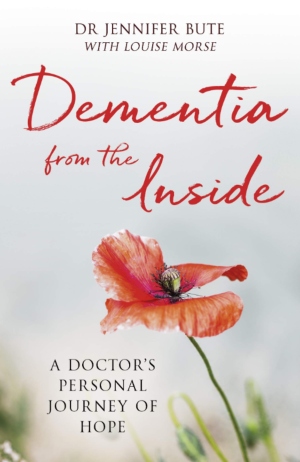Dementia from the Inside
How does it feel to live with dementia? And where is God in this? Dementia from the Inside is a book written from the point of view of Jennifer Bute, a doctor diagnosed with early-onset dementia. It says all you really need to know, writes Louise Morse
 When my first book on dementia[i] was published in 2008, Dr Jennifer Bute, a GP with over 25 years’ experience, including patients with dementia, was struggling to get a diagnosis of her own. It wasn’t until 2009 that she was diagnosed with Young Onset Dementia, thought to be Alzheimer’s, by leading neurologist, Professor Peter Garrard.
When my first book on dementia[i] was published in 2008, Dr Jennifer Bute, a GP with over 25 years’ experience, including patients with dementia, was struggling to get a diagnosis of her own. It wasn’t until 2009 that she was diagnosed with Young Onset Dementia, thought to be Alzheimer’s, by leading neurologist, Professor Peter Garrard.
I first heard of Jennifer when she wrote a review of my book, Could it be Dementia? for a Christian magazine, but we didn’t meet in person until six years (and three books) later when we found ourselves both speaking at a conference in Birmingham. Since then we’ve shared many more platforms.
We were driving home from one when she asked what I thought about a request from a secular publisher to produce a book about her, to be ghost-written by a successful TV scriptwriter. By now Jennifer was having difficulty with words and knew that a book would be beyond her, although she still writes short blogs and continues to give excellent talks. A striking aspect of Jennifer is her relationship with God, and I thought that a book that omitted this would be like describing a fighter jet without the engine. It wouldn’t be true account and wouldn’t give God glory.
Jennifer radiates the joy of the Lord. Who else has seen dementia as a ‘glorious opportunity’, and has a website (www.gloriousopportunity.org) with videos, leaflets and information to help others with the disease, and their families and caregivers?
After some thought and prayer, we concluded that I would write the book with her. Then followed days of recordings in her flat at the St. Monica’s Trust, agreeing the structure, drafting the chapters and writing the final manuscript. Each chapter was sent to independent reviewers, as well as Jennifer’s adult children. The completed manuscript was sent to 21 experts in dementia and related fields, who gladly wrote commendations. (They fill the first seven pages.); I was delighted that I could write the book in Jennifer’s own ‘voice’. I’d previously written speeches and articles for others. ‘It doesn’t sound like your other books,’ a reader told me. ‘No, it’s Jennifer’s story, and so much more,’ I replied.
It’s the ‘so much more’ that makes this book truly unique. As far as I can tell, there’s nothing like it. Most biographies, ghost-written or not, are about the people concerned, and how dementia is affecting them.
But people want to know how it feels to live with dementia, to help them understand those who have developed it. What really helps? How to communicate with people with dementia, especially in the later stages? What explains disturbing behaviour – and what’s the best intervention? Where is God in all this? Jennifer gives the answers to these, and so much more in Dementia from the Inside.
The book includes Jennifer’s ‘back story’ which is fascinating, revealing the resilience learnt in tough times and the depth of her relationship with God, but she also speaks as a doctor. In the dementia inclusive village where she lives, she visits the lonely and those with dementia, building bridges to bring them to faith or to reignite the love that has faded. Her narrative radiates wisdom and compassion.
The stories are mini case studies. Jennifer describes the releasing effect of laughter and singing, and how a lady who was stuck, like a gramophone record, on the sentence, ‘the peas are green on Saturday,’ returned to lucidity and was able to speak after listening to a Scripture song. And how another person with advanced dementia, who normally says very little, suddenly started telling her stories about her childhood that Jennifer hadn’t heard before, after they’d been laughing together.
The book not only takes readers inside dementia, but describes, from a professional medical background, how to understand and how to help others. As Jeremy Hughes, CEO of the Alzheimer’s Society wrote, ‘We should all read and learn from Jennifer and turn that learning into action.’
[i] Could it be Dementia? Losing your mind doesn’t mean losing your soul: 2008, Louise Morse, Lion Monarch.
Louise Morse works with the Pilgrims' Friend Society, is a speaker and has a background in journalism. She is author of Could it be Dementia? (2008), Worshipping with Dementia (2010:), Dementia: Frank and Linda's Story, (2010) Dementia: Pathways to Hope (2015) and What's Age Got to Do with It? (2018).
Do you have a view? Share your thoughts via our letters' page.
Baptist Times, 22/05/2019